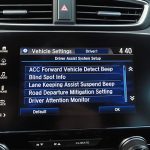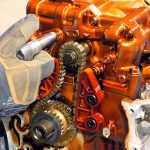The 2003 Honda Element was a popular compact SUV that was produced and sold by Honda Motor Company. However, like any vehicle, the 2003 Honda Element was not without its problems.
Some common issues reported by owners of the 2003 Honda Element include transmission problems, suspension issues, and problems with the fuel system. Additionally, there have been reports of electrical issues and problems with the air conditioning system.
It is important for owners of the 2003 Honda Element to be aware of these potential issues in order to address them promptly and maintain the reliability and safety of their vehicle.

2003 Honda Element Problems
1. Door lock may be sticky and not work due to worn door lock tumblers
This issue is caused by wear and tear on the door lock tumblers, which can cause them to become sticky and difficult to turn. This can make it difficult or impossible to lock or unlock the doors of the 2003 Honda Element.
2. SRS light due to faulty wire harness for seat belts
The SRS light, or Supplemental Restraint System light, is a warning light that indicates a problem with the vehicle’s airbag or seat belt system. In the 2003 Honda Element, this light may come on due to a faulty wire harness for the seat belts.
This can cause the airbags to malfunction or not deploy in the event of a collision, which can compromise the safety of the vehicle’s occupants.
3. Groaning noise on turns due to differential fluid breakdown
The differential is a component of the 2003 Honda Element’s drivetrain that helps to distribute power to the wheels. If the differential fluid breaks down, it can cause a groaning noise when the vehicle is turning.
This can be caused by a variety of factors, such as improper lubrication or the presence of contaminants in the fluid. It is important to address this issue promptly, as a malfunctioning differential can lead to decreased performance and handling, and can potentially cause damage to other components of the drivetrain.
4. Warped front brake rotors may cause vibration when braking
Warping of the front brake rotors can occur due to a variety of factors, such as excessive heat or improper installation. When the rotors become warped, they can cause a vibrating sensation when the brakes are applied.
This can be a dangerous problem, as it can cause decreased braking performance and make it difficult to stop the vehicle in a timely manner.
5. Maladjusted rear tailgate will cause rear hatch light to come on
If the rear tailgate of the 2003 Honda Element is not properly adjusted, it can cause the rear hatch light to come on. This light is designed to alert the driver when the tailgate is not fully closed. If the tailgate is not properly adjusted, it can cause the light to come on even when the tailgate is closed, which can be frustrating for the driver.
6. Engine leaking oil
Oil leaks can occur in any vehicle, and the 2003 Honda Element is no exception. Oil leaks can be caused by a variety of factors, such as wear and tear on seals and gaskets, or damage to the engine itself.
If the engine is leaking oil, it can cause decreased performance and potentially lead to further damage if not addressed promptly.
It is important to address any oil leaks as soon as they are discovered in order to maintain the health and longevity of the engine.
7. Check engine light due to faulty A/F sensor
The check engine light is a warning light that indicates a problem with the vehicle’s engine or emissions system. In the 2003 Honda Element, this light may come on due to a faulty A/F sensor, also known as an oxygen sensor. The A/F sensor measures the amount of oxygen in the exhaust gas, and sends this information to the engine’s computer.
If the sensor is faulty, it can cause the check engine light to come on and potentially lead to decreased performance and fuel efficiency.
8. Software update will stop car from moving faster than expected
Some 2003 Honda Element models may have received a software update to address a problem with the vehicle’s acceleration. This update was intended to prevent the vehicle from moving faster than the driver intended, which could be caused by a malfunctioning accelerator pedal sensor.
9. Faulty ELD may cause head lights to dim and CEL
The ELD, or Electronic Load Detector, is a component that helps to control the electrical load on the vehicle’s battery. If the ELD is faulty, it can cause the head lights to dim and the CEL, or Check Engine Light, to come on. This can be caused by a variety of factors, such as a malfunctioning ELD or a problem with the vehicle’s electrical system.
10. Replace fuel gauge to fix incorrect empty reading and indicator light
The fuel gauge in the 2003 Honda Element is designed to display the amount of fuel in the tank and alert the driver when the fuel level is low. If the fuel gauge is not functioning correctly, it can display an incorrect reading or cause the low fuel indicator light to come on when the tank is not actually empty.
In this case, the fuel gauge may need to be replaced in order to correct the issue.
11. PCM may misinterpret low voltage condition and cause false CEL
The PCM, or Powertrain Control Module, is a computer that controls various systems in the 2003 Honda Element, such as the engine and transmission. If the PCM interprets a low voltage condition incorrectly, it can cause the CEL, or Check Engine Light, to come on unnecessarily.
This can be caused by a variety of factors, such as a malfunctioning sensor or a problem with the electrical system.
12. PCM may misinterpret idle circuit data and cause high idle/CEL
If the PCM interprets data from the idle circuit incorrectly, it can cause the engine to idle at a higher speed than normal. This can cause the CEL to come on and may result in decreased fuel efficiency and performance.
13. Groaning noise on turns due to differential fluid breakdown
As mentioned earlier, the differential is a component of the 2003 Honda Element’s drivetrain that helps to distribute power to the wheels. If the differential fluid breaks down, it can cause a groaning noise when the vehicle is turning.
This can be caused by a variety of factors, such as improper lubrication or the presence of contaminants in the fluid.
It is important to address this issue promptly, as a malfunctioning differential can lead to decreased performance and handling, and can potentially cause damage to other components of the drivetrain.
Possible Solution
| Problem | Possible Solution |
| Door lock may be sticky and not work due to worn door lock tumblers | Replace the door lock tumblers |
| SRS light due to faulty wire harness for seat belts | Replace the wire harness for the seat belts |
| Groaning noise on turns due to differential fluid breakdown | Replace the differential fluid and inspect for any other issues with the differential |
| Warped front brake rotors may cause vibration when braking | Replace the front brake rotors |
| Maladjusted rear tailgate will cause rear hatch light to come on | Adjust the rear tailgate to ensure it is properly aligned |
| Engine leaking oil | Replace any damaged seals or gaskets and address any other issues causing the oil leak |
| Check engine light due to faulty A/F sensor | Replace the A/F sensor |
| Software update will stop car from moving faster than expected | Install the software update if it has not already been done |
| Faulty ELD may cause head lights to dim and CEL | Replace the ELD and inspect the electrical system for any other issues |
| Replace fuel gauge to fix incorrect empty reading and indicator light | Replace the fuel gauge |
| PCM may misinterpret low voltage condition and cause false CEL | Replace the PCM or repair any issues with the electrical system |
| PCM may misinterpret idle circuit data and cause high idle/CEL | Replace the PCM or repair any issues with the idle circuit |
| Groaning noise on turns due to differential fluid breakdown | Replace the differential fluid and inspect for any other issues with the differential |
2003 Honda Element Recalls
| Recall | Issue | Affected Models | Date Issued |
| Recall 19V501000 | Newly Replaced Passenger Air Bag Inflator Ruptures During Deployment Spraying Metal Fragments | 10 models | Jul 1, 2019 |
| Recall 19V499000 | Newly Replaced Driver’s Air Bag Inflator Ruptures During Deployment Spraying Metal Fragments | 10 models | Jul 1, 2019 |
| Recall 19V182000 | Driver’s Frontal Air Bag Inflator Ruptures During Deployment Spraying Metal Fragments | 14 models | Mar 7, 2019 |
| Recall 18V268000 | Front Passenger Air Bag Inflator Potentially Installed Improperly During Replacement | 10 models | May 1, 2018 |
| Recall 16V344000 | Passenger Frontal Air Bag Inflator Ruptures On Deployment | 8 models | May 24, 2016 |
| Recall 15V370000 | Front Passenger Air Bag Defective | 7 models | Jun 15, 2015 |
| Recall 15V320000 | Driver’s Front Air Bag Defective | 10 models | May 28, 2015 |
| Recall 14V700000 | Front Airbag Inflator Module | 9 models | Nov 4, 2014 |
| Recall 14V353000 | Front Airbag Inflator Module | 9 models | Jun 20, 2014 |
| Recall 10V364000 | Honda Recalls 2003-2004 Vehicles Due to Defective Ignition Switch | 3 models | Aug 5, 2010 |
Recall 19V501000:
This recall was issued due to an issue with the passenger air bag inflator, which could rupture during deployment and spray metal fragments. This could cause serious injury or death to the vehicle’s occupants.
Recall 19V499000:
This recall was issued due to an issue with the driver’s air bag inflator, which could rupture during deployment and spray metal fragments. This could cause serious injury or death to the vehicle’s occupants.
Recall 19V182000:
This recall was issued due to an issue with the driver’s frontal air bag inflator, which could rupture during deployment and spray metal fragments. This could cause serious injury or death to the vehicle’s occupants.
Recall 18V268000:
This recall was issued due to a potential issue with the installation of the front passenger air bag inflator during replacement. If the air bag was improperly installed, it could deploy improperly in the event of a crash, increasing the risk of injury.
Recall 16V344000:
This recall was issued due to an issue with the passenger frontal air bag inflator, which could rupture during deployment and spray metal fragments. This could cause serious injury or death to the vehicle’s occupants.
Recall 15V370000:
This recall was issued due to a problem with the front passenger air bag, which could deploy improperly in the event of a crash. This could increase the risk of injury to the vehicle’s occupants.
Recall 15V320000:
This recall was issued due to a problem with the driver’s front air bag, which could deploy improperly in the event of a crash. This could cause serious injury or death to the driver or other occupants.
Recall 14V700000:
This recall was issued due to an issue with the front airbag inflator module, which could rupture during deployment and spray metal fragments. This could cause serious injury or death to the vehicle’s occupants.
Recall 14V353000:
This recall was issued due to an issue with the front airbag inflator module, which could rupture during deployment and spray metal fragments. This could cause serious injury or death to the vehicle’s occupants.
Recall 10V364000:
This recall was issued due to a problem with the ignition switch, which could allow the vehicle to roll away even if the ignition key has been removed. This could increase the risk of a crash.
Problems and Complaints Sources
https://repairpal.com/2003-honda-element/problems
https://www.carcomplaints.com/Honda/Element/2003/
All Honda Element years we talked –




